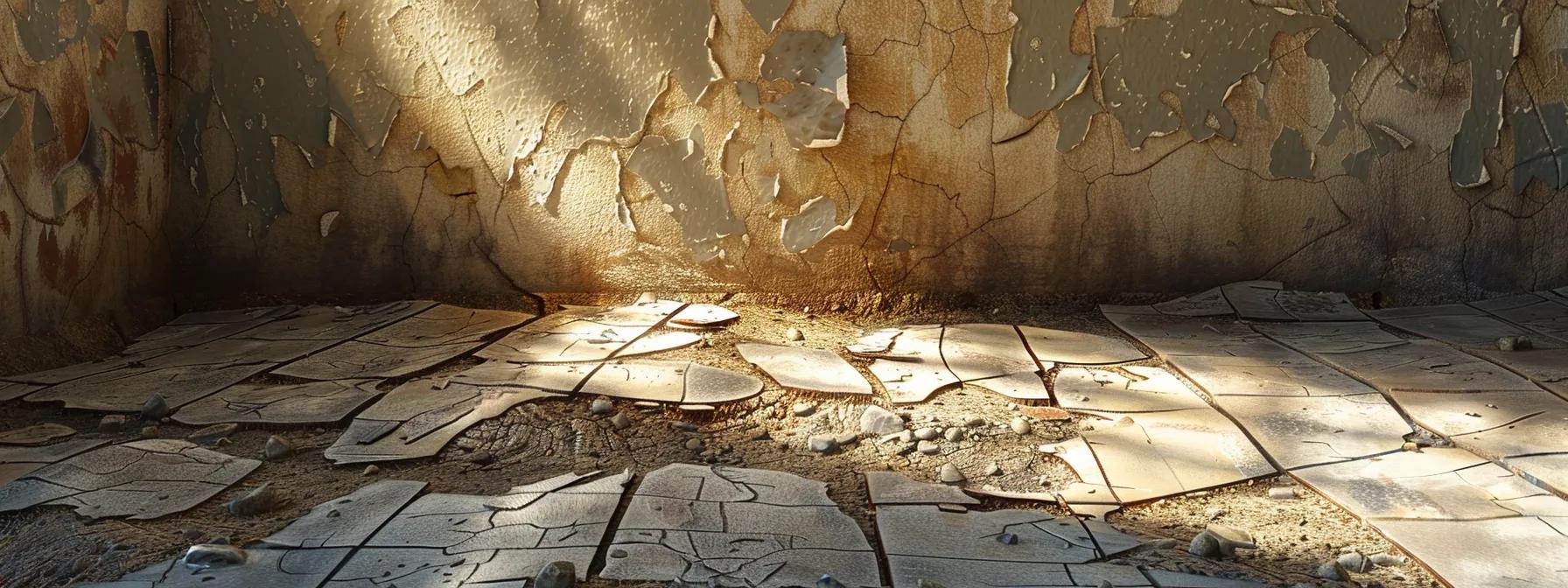The Shocking Truth About Foundation Damage and Home Prices
Introduction
Foundation damage can severely affect a home’s structural integrity and market value. Homeowners with cracked foundations, uneven floors, or other structural issues face costly repairs and long-term financial challenges. This article examines common foundation problems, early warning signs, assessment methods, repair costs, resale value impacts, and long-term home equity concerns. It also discusses factors influencing home valuation, practical repair steps, and preventive measures. Ultimately, this guide helps homeowners make informed decisions about foundation repair and maintenance and navigate the repair and negotiation process.
Understanding Foundation Issues and Their Impact on Home Value

The foundation supports the entire building, ensuring stability. Signs such as wall cracks, uneven floors, or malfunctioning doors and windows are early indicators of potential foundation settlement or structural disturbances.
Identify Common Types of Foundation Problems in Homes
Common issues include settlement, shifting, and cracking. Settlement may occur from soil shrinkage, drainage problems, or seismic activity, while shifting can result from poor construction practices or soil moisture changes. Cracks often develop gradually from wear and tear or sudden impacts. Structural elements like foundation walls, footings, and piers can deteriorate due to moisture intrusion or the weight of additions such as chimneys. Recognizing these signs early is critical to prevent further damage.
Recognize Symptoms of Foundation Issues Early
Typical early symptoms include visible cracks on walls, floors, or ceilings; sticking doors and windows; sloping floors; and gaps between walls and ceilings. Other red flags include uneven tile placements and signs of water damage, especially in basements or crawl spaces. Such indicators warrant evaluation by a foundation repair expert to initiate timely repairs.
Learn How Foundation Problems Are Assessed
Assessment involves a thorough evaluation by structural engineers or foundation repair companies using specialized equipment to measure levels and detect soil moisture variations. Professionals consider local soil conditions, drainage patterns, and construction quality. Modern methods may include digital scanning or imaging to visualize underground elements. An accurate assessment identifies the damage extent and helps form a repair plan that addresses both immediate fixes and long-term reinforcement.
Analyzing the Financial Consequences of Foundation Damage
Foundation damage carries serious financial consequences. Repair costs extend beyond immediate maintenance, influencing insurance premiums, property values, and resale opportunities. Understanding these repercussions is essential for budgeting repairs or planning renovations.
Evaluate Repair Costs for Foundation Issues
Repair costs vary by the severity of the problem, repair method, and local labor rates. Minor repairs may cost a few thousand dollars, while extensive work on concrete slabs, crawl spaces, or pier and beam constructions can cost tens of thousands. Unexpected complications such as water damage or unstable soil may increase prices. It is advisable to get multiple quotes from reputable foundation repair companies to ensure a fair price.
Understand How Foundation Problems Affect Resale Value
Foundation damage can lower resale value as buyers are wary of potential recurring problems and costly repairs. Even after repairs, a history of foundation issues may reduce appraised value. Real estate agents recommend full disclosure and documented professional repairs to mitigate buyer concerns. Properties with unresolved issues tend to command lower market prices.
Consider Long-Term Impacts on Home Equity
Beyond immediate costs, foundation problems can erode home equity over time. As damage worsens, property values depreciate and refinancing or obtaining loans becomes more difficult. Conversely, homes with solid, well-maintained foundations tend to hold value better. Addressing foundation issues early is an investment in long-term equity and stability.
Factors That Influence Home Valuation Related to Foundation

Several factors influence how foundation damage affects market value. These include location, repair quality, and broader real estate market trends. Understanding these factors helps homeowners and buyers make better investment and repair decisions.
Examine the Role of Location and Neighborhood Conditions
Location is a key determinant of home value. Homes in areas with high water tables, poor drainage, or soil prone to expansion and shrinkage are more vulnerable to foundation issues. Older neighborhoods may experience more frequent problems; however, if repairs are done properly, such homes can still command higher prices. Buyers in desirable areas are often willing to overlook minor concerns if repairs are well documented. In lower-demand areas, foundation issues may lead to sharper value declines.
Investigate Market Trends Affecting Home Values
Real estate market conditions also affect how foundation damage is valued. In a strong economic climate with high demand, even homes with minor issues may retain higher values. In a sluggish market, buyers have more negotiating power, and foundation problems can significantly reduce a home’s price. Shifts in mortgage rates, local economic conditions, and a preference for move-in-ready properties all impact how foundation repairs are perceived.
Assess Quality of Repairs and Their Effect on Valuation
The quality of foundation repairs directly influences home value. High-quality repairs using advanced materials and techniques can restore both structural integrity and market value. In contrast, substandard repairs may provide only temporary relief, leading to recurring issues and further devaluation. Homeowners should rely on reputable foundation repair companies that offer warranties and certifications. Documentation of the repair process reassures buyers and appraisers of the home’s renewed stability.
Steps to Take When Facing Foundation Issues
When foundation issues arise, it is vital for homeowners to address them promptly. Taking a proactive approach can minimize further damage and financial impact. Key steps include professional inspections, researching repair companies, and exploring financing options.
Get a Professional Inspection to Assess Damage
The first step is to hire a certified structural engineer or foundation repair expert to inspect the property. A thorough evaluation identifies all damaged areas, clarifies underlying causes, and suggests a comprehensive repair plan. Using advanced tools, inspectors measure structural shifts, evaluate soil conditions, and assess water drainage issues. This diagnosis is crucial for planning repairs and providing documentation for negotiations with buyers or insurance companies.
Research Reputable Foundation Repair Companies
After determining the extent of the damage, homeowners should obtain quotes from several reputable companies. Look for firms with positive reviews, proper certifications, and extensive experience in foundation repair. Ask about methods, materials, warranties, and timelines. Comparing multiple quotes ensures competitive pricing without compromising quality. Recommendations from local real estate agents or community members can also be helpful.
Determine Financing Options for Foundation Repairs
Foundation repairs can be expensive, so exploring financing options is often necessary. Many repair companies offer financing plans or extended payment options. Home equity loans, refinancing, or government grants may also be available to help manage costs. Combining professional repair estimates with a sound financial plan can protect long-term home equity and ensure repairs are completed efficiently.
Preventive Measures to Avoid Foundation Problems

Prevention is the best strategy for avoiding costly foundation repairs. Homeowners can take proactive steps to safeguard their property through proper maintenance and inspection.
Implement Proper Drainage Systems Around Your Home
A critical preventive measure is ensuring water is directed away from the foundation. Proper drainage systems—such as gutters, downspouts, and French drains—prevent water accumulation that can cause erosion, moisture seepage, and soil instability. Regular cleaning and maintenance of these systems are necessary to avoid blockages. In some cases, additional drainage solutions may be required to manage heavy rainfall or stormwater.
Regularly Inspect for Signs of Water Damage
Routine inspections of the basement, crawl space, and exterior walls help detect early signs of water damage such as damp spots, mold, or efflorescence. Early intervention, like installing waterproof membranes or improving drainage, can prevent more severe issues. Periodic professional inspections by a structural engineer are also recommended to catch subtle changes before they become major problems.
Maintain Vegetation and Landscaping That Affects Foundation
Proper landscaping can significantly impact foundation stability. Overgrown trees and shrubs near the home can cause root intrusion and soil displacement, increasing structural pressure. Conversely, well-planned landscaping with regular pruning, mulch application, and proper grading can help stabilize soil and improve drainage. Such maintenance is a cost-effective way to support foundation health over the long term.
Real Estate Insights on Buying Homes With Foundation Issues
Purchasing a home with foundation issues requires careful consideration and informed decision-making. Both buyers and sellers must weigh the risks and potential rewards.
Analyze Risks and Rewards of Purchasing Affected Properties
While foundation issues are a concern, they are not always a deal-breaker. Homes with foundation damage often come with lower price tags, making them attractive investments if repairs are manageable and the property is in a desirable location. However, buyers must consider the uncertainty of repair quality and the potential for additional costs. A thorough risk-reward analysis, including repair estimates and financing options, is essential.
Understand Disclosure Requirements From Sellers
Sellers are legally required to disclose known foundation issues. Comprehensive disclosure documents, including inspection reports and repair records, play a critical role in negotiations. Buyers should review these disclosures carefully and may request additional inspections to verify the information. Full transparency helps ensure buyers are aware of the repairs needed and sets realistic expectations regarding costs and timelines.
Prepare for Negotiations Based on Foundation Concerns
Foundation issues can be used as negotiation leverage. Buyers can request a lower purchase price or ask for specific repairs to be completed before the sale. Effective negotiation depends on a clear understanding of the repair history, current market conditions, and potential impacts on home value. Both buyers and real estate agents should come prepared with detailed data and repair estimates to support their position.
Frequently Asked Questions
Q: What are the most common signs of foundation damage? A: Common signs include visible cracks in walls or ceilings, uneven or sloping floors, sticking doors and windows, and moisture issues in basements or crawl spaces. Early detection is crucial for prompt repair.
Q: How do foundation repair costsimpact home value? A: Repair costs can significantly lower home value if not addressed, as unresolved issues deter buyers. Quality repairs help restore structural integrity and maintain or improve market value.
Q: Can foundation damagebe prevented with regular maintenance? A: Yes, preventive measures such as proper drainage, regular inspections, and careful landscaping can reduce the risk of major foundation problems.
Q: What should a professional inspectionfor foundation issuesinclude? A: A thorough inspection evaluates structural shifts, soil conditions, and water drainage issues. Modern digital tools may be used to document and analyze damage accurately.
Q: How do foundation issuesaffect financing and mortgageoptions? A: Lenders view foundation damage as a risk factor, which can lead to higher rates or more restrictive loan conditions. Comprehensive documentation and professional assessments can mitigate some concerns.
Q: Are there financing options available specifically for foundationrepairs? A: Yes, many repair companies offer financing plans. Home equity loans, refinancing options, and government grants can also help manage repair costs.
Q: Is it advisable to buy a home with known foundationproblems? A: It can be a viable option if the issues are well documented and repair estimates are favorable. Buyers should carefully analyze risks, negotiate price reductions, and secure professional documentation to protect their investment.
Final Thoughts
Foundation damage affects both structural integrity and market value. Early detection, thorough assessment, and high-quality repairs are essential to safeguarding property investment. Homeowners and buyers benefit from understanding the financial risks and long-term implications associated with foundation issues. Proactive maintenance, transparent disclosures, and informed negotiations are key to mitigating these impacts and protecting the home’s value over time.


